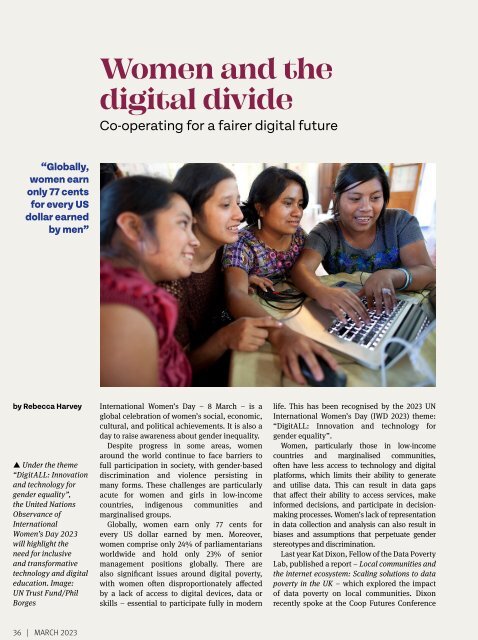Co-op News March 2023
The March edition of Co-op News: connecting, challenging and championing the global co-operative movement. This issue includes a special news report on the response by co-ops to the earthquake disasters in Syria and Turkey. And we look at US Black History Month, International Women's Day and the UK Fairtrade Fortnight - including our shopping guide for a range of fabulous Fairtrade gifts. Plus reports from the Future Co-ops and UKSCS conferences, as the movement looks to define its role in dealing with the multiple crises facing the world. And there are features on waste picker co-ops in South America, the circular economy in Quebec and and the UN's Sustainable Development agenda.
The March edition of Co-op News: connecting, challenging and championing the global co-operative movement. This issue includes a special news report on the response by co-ops to the earthquake disasters in Syria and Turkey. And we look at US Black History Month, International Women's Day and the UK Fairtrade Fortnight - including our shopping guide for a range of fabulous Fairtrade gifts. Plus reports from the Future Co-ops and UKSCS conferences, as the movement looks to define its role in dealing with the multiple crises facing the world. And there are features on waste picker co-ops in South America, the circular economy in Quebec and and the UN's Sustainable Development agenda.
Create successful ePaper yourself
Turn your PDF publications into a flip-book with our unique Google optimized e-Paper software.
Women and the<br />
digital divide<br />
<strong>Co</strong>-<strong>op</strong>erating for a fairer digital future<br />
“Globally,<br />
women earn<br />
only 77 cents<br />
for every US<br />
dollar earned<br />
by men”<br />
by Rebecca Harvey<br />
p Under the theme<br />
“DigitALL: Innovation<br />
and technology for<br />
gender equality”,<br />
the United Nations<br />
Observance of<br />
International<br />
Women’s Day <strong>2023</strong><br />
will highlight the<br />
need for inclusive<br />
and transformative<br />
technology and digital<br />
education. Image:<br />
UN Trust Fund/Phil<br />
Borges<br />
International Women’s Day – 8 <strong>March</strong> – is a<br />
global celebration of women’s social, economic,<br />
cultural, and political achievements. It is also a<br />
day to raise awareness about gender inequality.<br />
Despite progress in some areas, women<br />
around the world continue to face barriers to<br />
full participation in society, with gender-based<br />
discrimination and violence persisting in<br />
many forms. These challenges are particularly<br />
acute for women and girls in low-income<br />
countries, indigenous communities and<br />
marginalised groups.<br />
Globally, women earn only 77 cents for<br />
every US dollar earned by men. Moreover,<br />
women comprise only 24% of parliamentarians<br />
worldwide and hold only 23% of senior<br />
management positions globally. There are<br />
also significant issues around digital poverty,<br />
with women often dispr<strong>op</strong>ortionately affected<br />
by a lack of access to digital devices, data or<br />
skills – essential to participate fully in modern<br />
life. This has been recognised by the <strong>2023</strong> UN<br />
International Women’s Day (IWD <strong>2023</strong>) theme:<br />
“DigitALL: Innovation and technology for<br />
gender equality”.<br />
Women, particularly those in low-income<br />
countries and marginalised communities,<br />
often have less access to technology and digital<br />
platforms, which limits their ability to generate<br />
and utilise data. This can result in data gaps<br />
that affect their ability to access services, make<br />
informed decisions, and participate in decisionmaking<br />
processes. Women’s lack of representation<br />
in data collection and analysis can also result in<br />
biases and assumptions that perpetuate gender<br />
stereotypes and discrimination.<br />
Last year Kat Dixon, Fellow of the Data Poverty<br />
Lab, published a report – Local communities and<br />
the internet ecosystem: Scaling solutions to data<br />
poverty in the UK – which explored the impact<br />
of data poverty on local communities. Dixon<br />
recently spoke at the <strong>Co</strong><strong>op</strong> Futures <strong>Co</strong>nference<br />
36 | MARCH <strong>2023</strong>

















